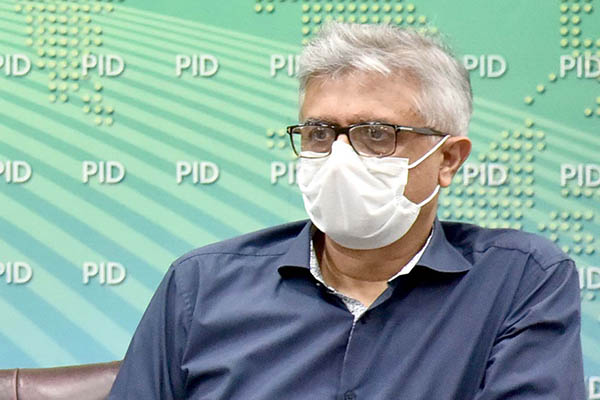
Courtesy PID
Special Assistant to the P.M. on Health says restrictions are ‘baseline’ and all federating units can expand them further if required
In light of a new surge in coronavirus infections, Pakistan on Wednesday announced it was re-imposing preventative measures that had earlier been announced to be ending from Monday (March 15).
Addressing a press conference after a meeting of the National Command and Operation Center (NCOC), Special Assistant to the P.M. on Health Dr. Faisal Sultan said that cases were once again on the rise, as was the national positivity ratio. “We are now seeing more patients coming to healthcare facilities than were coming in February,” he said.
“In light of this situation, we have taken some decisions [to curb the spread of the virus],” he said, noting that the government would continue to stress mask compliance. “All provincial governments have also been directed to continue using smart lockdowns,” to reduce the spread of the pandemic, he said.
According to Dr. Sultan, the following decisions have been taken by the NCOC:
- Islamabad to enforce 50 percent work-from-home for all office with immediate effect. Individual provinces will be allowed to decide its implementation at their discretion and can decide which districts and cities require it.
- Commercial activities will be required to halt nationwide at 10 p.m. This will not apply to essential services.
- Amusement parks nationwide must shutter at 6 p.m. If any provinces or cities which to close them earlier, they have the right to do so.
- Indoor wedding, shrines, and cinemas, set to reopen from March 15, will remain closed in light of the prevailing situation. These restrictions will continue until April 15, when they would be revisited. Outdoor dining and wedding receptions would continue without hindrance.
- The government would continue to enforce a 300-person limit on outdoor gatherings with strict enforcement of SOPs.
- All recommendations of the NCOC would be reviewed on April 12 and a decision on whether to extend or halt them would be taken in light of the coronavirus situation at the time.
“These are baseline decisions. Any federating unit that wants to expand these restrictions is allowed to do so in light of their ground realities,” said the top health official.
Dr. Sultan also urged people over 60 to register for the vaccine and await further instructions. “If you are tasked with a center that is too far away from you, you can call 1166 or visit nims.nadra.gov.pk and request a change of center,” he added.
Educational institutions
Federal Education Minister Shafqat Mahmood, meanwhile, said that the NCOC had also reviewed its decisions on educational institutions in light of the new surge of cases. “The good news is that the situation in Sindh and Balochistan is mostly fine,” he said, adding that students in those provinces would be allowed to attend in-person classes daily with 50 percent attendance.
“In the rest of the country, we have seen some concerning data,” he said. “Apart from some cities [that have high incidences of COVID-19], they will also be allowed to have 50 percent attendance of students daily,” he added. Listing the cities that would face further restrictions, he said that the government was announcing spring vacations for students in Faisalabad, Gujranwala, Lahore, Gujrat, Multan, Rawalpindi, Sialkot, Islamabad, Peshawar and Muzaffarabad from March 15 to March 28. “Schools will reopen on March 29,” he said.
According to the minister, provincial governments would continue to review the ground realities regularly and would be empowered to close schools in more cities as and if needed. “The NCOC will also be reviewing data over the next two weeks to see how situation develops,” he added.
Mahmood cautioned, however, that schools with exams needed for promotions would continue as normal and no examinations would be cancelled or delayed.
Pakistan has witnessed a surge of new coronavirus infections in the past two weeks, with health officials warning of a “third wave.” While the government has commenced a coronavirus vaccination program, it has thus far only inoculated less than 300,000 frontline healthcare workers. Vaccinations of people 60 and over commenced from today (Wednesday).
